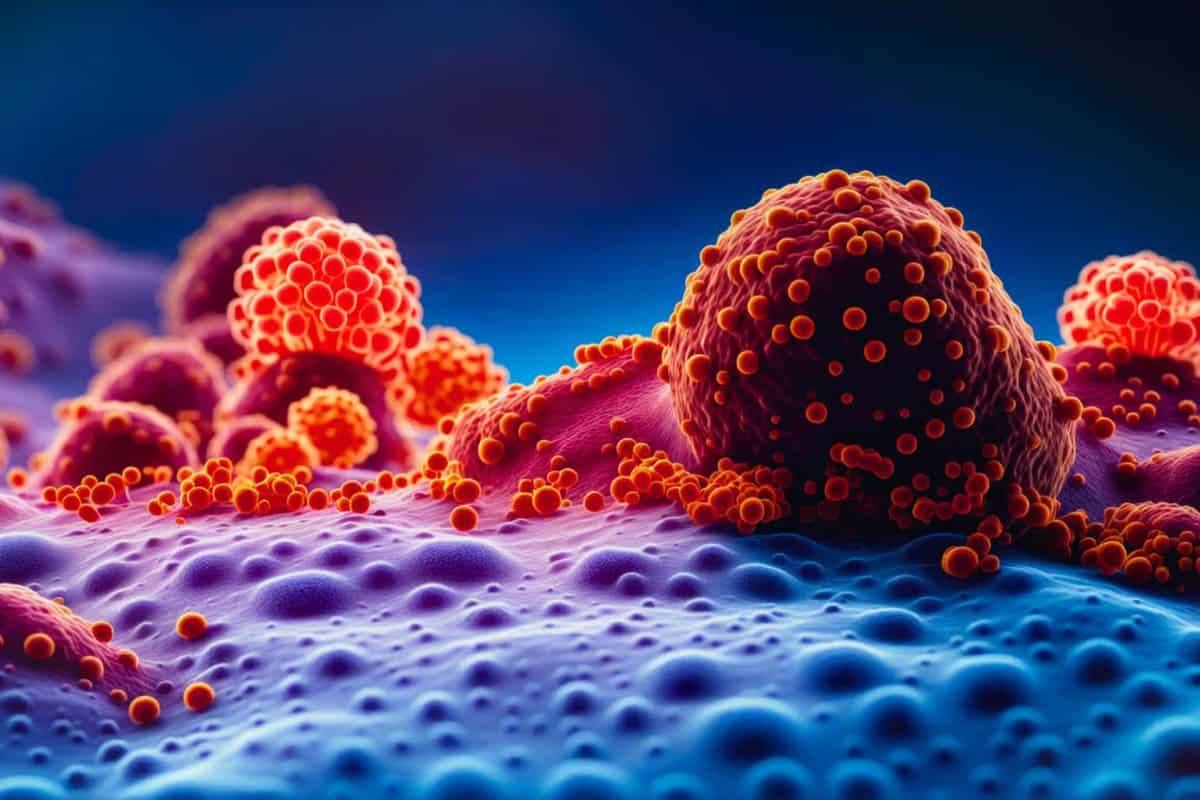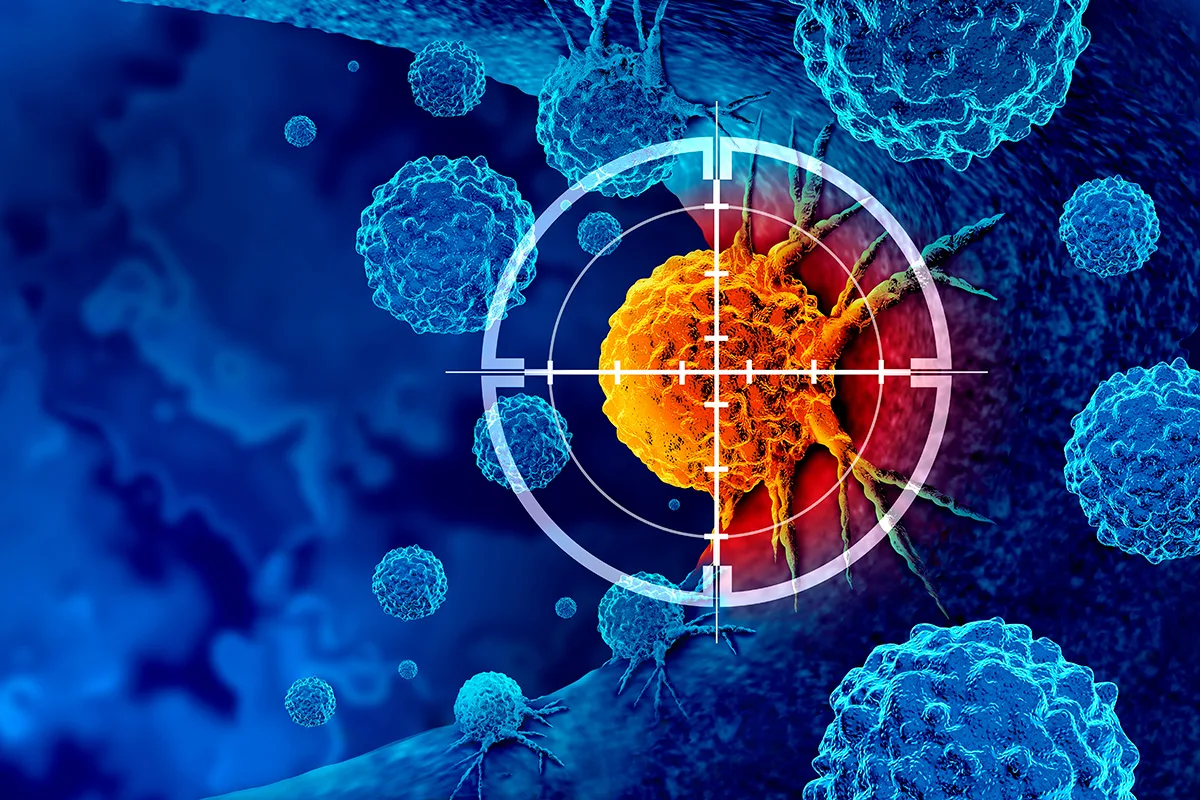5 questions about immunotherapy Immunotherapy is a treatment that aims to stimulate the body’s immune defences. It is…
Genetically modified human cells to treat cancer that are both ‘ready to use’ and resistant to patients’ immune systems? This is what a team of American researchers has just developed, and it could well revolutionise the care of people affected by cancer.
The use of CAR-NK (Chimeric Antigenic Receptor – Natural Killer) cells is a cancer treatment strategy currently undergoing rapid development. This is known as personalised immunotherapy.
It is based on the genetic modification of NK lymphocytes, a type of white blood cell (immune cell), to turn them into veritable ‘tumour killers’.
How are CAR cells designed?
The principle:
- A blood sample is taken from the cancer patient to extract NK lymphocytes.
- These lymphocytes are genetically modified so that they can produce a protein called ‘chimeric antigen receptors’ (CAR) that target specific proteins on the surface of tumour cells.
- ‘Costimulation’ elements are introduced, enabling the CAR-NK cell to activate and attack the cancer cell once it has attached itself to it.
- CAR-NK cells are cultured and allowed to multiply in vitro until there are enough of them.
- They are then transfused into the patient.
Revolution in cancer treatment research
This approach is also used with T lymphocytes (CAR-T cells), another type of immune cell. CAR-T cells are already approved for treating cancers such as lymphoma and leukaemia, while CAR-NK cells are still in the clinical trial phase.
The CAR approach is revolutionary for the management of cancer patients, as it allows for extremely targeted treatment of cancer with minimal side effects.
However, there are still a number of obstacles. For example, the preparation phase is relatively long (several weeks), the modified cells can be destroyed by the immune system, and the lymphocytes taken from cancer patients may be less viable due to the disease, which sometimes poses a problem in the in vitro multiplication phase.
Ready to use, more resistant and more virulent against tumours
In a new study published in Nature Communications, American researchers from MIT (Massachusetts Institute of Technology) and Harvard Medical School explain how they have designed an improved version of CAR-NK cells.
According to them, these cells could be administered by doctors immediately after diagnosis, without going through the preparation phase, and would be much less likely to be attacked by the patient’s immune system.
This approach would make it possible to “design CAR-NK cells in a single step that can avoid rejection by host T cells and other immune cells. In addition, they kill cancer cells more effectively and are safer,” explains Jianzhu Chen, professor of biology at MIT and one of the study’s lead authors.
The effectiveness of CAR-NK cells could surpass that of CAR-T cells already used to treat leukaemia, due to their greater safety.
Killing machines that thwart immune attacks
To develop this innovation, the researchers used NK lymphocytes from healthy donors. The aim was to be able to cultivate them in larger quantities and have them available when needed. To avoid the phenomenon of rejection, they genetically modified the CAR-NK cells so that they could ‘hide’ from the patient’s immune system.
To do this, they developed a technique to ensure that CAR-NK lymphocytes from healthy donors do not express the proteins called HLA class 1, which are normally present on their surface. It is these molecules that are recognised by the immune system as ‘non-self’ and trigger attack and destruction by the recipient’s T lymphocytes.

Simplifying the genetic modification of lymphocytes
To facilitate the transformation of NK cells from healthy donors, the scientists combined all the modifications into a single fragment of DNA called a ‘construction’ comprising:
- the CAR gene for binding to cancer cells: in this case, proteins specific to CD-19 receptors on cancer cells of lymphoma;
- genes that activate the destruction of cancer cells;
- genes that disrupt the synthesis of HLA class 1 proteins.
They then transfused them into mouse models with an immune system similar to ours, into which lymphoma cancer cells had been introduced.
Enhanced efficacy
After three weeks, they found that the CAR-NK cells with the ‘construct’ DNA fragment had not only managed to slip through the mice’s immune system, but had also almost completely eliminated the cancer.
In contrast, the “conventional” CAR-NK cells and NK cells from healthy donors, but without genetic modifications – which the researchers had injected into two other groups of mice – had all been attacked by their immune systems.
The icing on the cake was that with these ready-to-use cells, there was less ‘cytokine release syndrome’, a classic side effect of immunotherapies that sometimes complicates treatment.
For the authors, this CAR-NK 2.0 cell-based approach could, if its efficacy is validated in humans, eventually replace therapies using CAR-T lymphocytes, particularly because of its better safety profile. This is definitely something to keep a close eye on!




